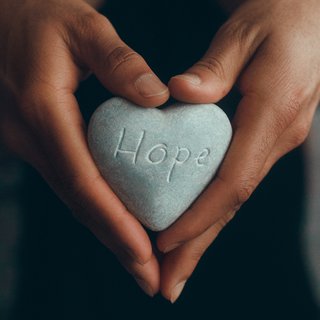A carers' guide to supporting your loved one through blood cancer treatment
Here you’ll find information for carers about how to support someone through treatment and beyond. These suggestions won’t solve every difficulty you’ll face, but we hope you’ll find something that will make life a little easier for you and your loved one.
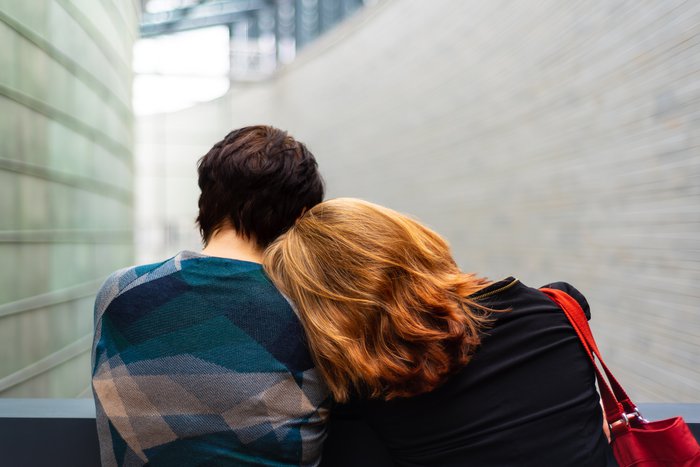
On this page:
If your loved one has inpatient treatment
If your loved one has outpatient treatment
Side effects: eating difficulties
Side effects: changes in appearance
Managing family life through treatment
If you're not a carer but want to help someone you know, read our information on how to support a friend or family member through treatment.
Finding information
If someone you love is about to go through treatment, you may have mixed feelings about it. On the on hand, it’s good they’re getting the treatment they need, but you may also be apprehensive about how treatment will affect them and your life together.
Something many people find helpful is to find out more about the specific treatment and what to expect.
- You can ask the hospital team – they should be happy to talk to you as long as your loved one gives their consent (permission). They may also have information sheets about drugs and drug side effects to give you, and the high risk of infection during treatment. If your loved one is at home in between treatments, ask what signs you should look out for. You will need to report these to the hospital team.
- You can do your own research – but beware of Google, because websites are not always accurate or up to date and can increase your anxiety. Stick to reputable sites like Blood Cancer UK, Anthony Nolan, Cancer Research UK, Macmillan and the NHS. Vij, who is living with a blood cancer called polycythaemia vera, has given us this thoughts about finding trustworthy information online.
- You can order printed information from specialist charities like us. Our booklets about blood cancer types, treatments and side effects are free to order, and postage is free too.
Anyone having treatment for blood cancer should have contact details for a key worker. This is often a clinical nurse specialist (CNS). They are there to answer your questions about diagnosis, treatment, side effects or anything else you want to know. They will also tell you where to find information and resources that may help.
Support for carers
It sometimes helps to talk worries through with someone who’s a good listener but not directly involved in your situation. Our free Support Service can help with that.
You may also find it helpful to read our information about carers and carers’ rights, including Am I a carer?
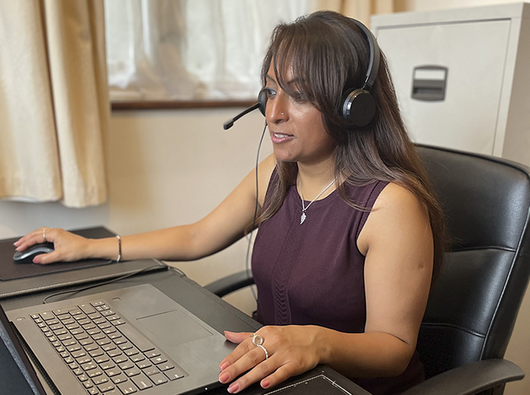
Inpatient or outpatient treatment?
Where your loved one will have their treatment depends on the type of blood cancer and the type of treatment they’re offered.
Some people will need stay in hospital for several weeks or even months to have treatment. Others will be treated in an outpatient clinic and go home in between appointments.
Some people will be treated with daily tablets. This is often a long-term treatment which is taken at home and monitored with regular check-ups.
If your loved one has inpatient treatment:
What to take to hospital
Sometimes there’s time to plan for a stay in hospital, but if your loved one needs treatment straight away, then packing the hospital bag may fall to you.
Here’s a list of things to consider putting in the bag, based on suggestions from people who’ve had blood cancer:
- a pillow or cushion
- a brightly coloured blanket
- night clothes
- comfortable day clothes
- plenty of underwear
- wash bag and toiletries
- photos of family and friends
- children’s drawings
- a mug
- tea bags or hot chocolate
- snacks
- hand cream and moisturiser
- picture-based or easy-read books and magazines
- adult colouring books
- eye masks and ear plugs for night-time
Visiting
If your family member is having treatment at a hospital, there are likely to be restrictions on visiting – when you can visit and how many people are allowed. This can be disappointing, but it doesn’t mean the hospital is uncaring.
People having cancer treatment can be very vulnerable to viruses and bacteria, so the restrictions are for their protection. These are likely to have been in place even before the covid pandemic.
Before you visit your loved one in hospital:
- Find out about the visiting times for the ward or clinic where your loved one is having treatment, and whether there are any restrictions on visiting such as the number of people allowed. Visiting time may be published on the hospital’s website, or you could phone the specific ward or clinic.
- Ask if you can bring food into hospital. Most hospitals are happy for you to do that. Treatment side effects can make it difficult for someone eat, so it’s important that your loved one can eat what they feel like eating, which may not be what’s on offer at the hospital.
- Don’t take flowers because they may not be allowed. The water in the vase is a source of germs and that’s not good for people with a weak immune system. There are other gifts you can take – something to keep your loved one occupied or snacks they might fancy.
If you can't visit, or can't visit as often as you'd like, video calls and messaging are a good way to stay in touch. Some hospital have tablets they can loan to patients if your loved one doesn't have a their one. There may be a regular phone they can use, but make sure you find out what the charges are.
Another way to show you're thinking of someone is to send a written note, card, or a care package. You may be able to drop these off at the hospital, but call first to find out where and when you can drop things off, and if there are any restrictions on what you can include. Make sure anything you send or drop off is clearly labelled with the person's name, date of birth and the name of the ward they're on.
Some hospitals have a dedicated inbox so families and friends can email their loved one and get their message delivered by staff or volunteers. Ask your loved one's keyworker or contact the hospital to find out if this is available.
“Dad wasn’t allowed any visitors at all because of the pandemic. Luckily, his room had a window overlooking the carpark, and I would drive up to the hospital with my mum, wave and have a chat.."
Read Jasmine’s story about supporting her dad through myeloma treatment
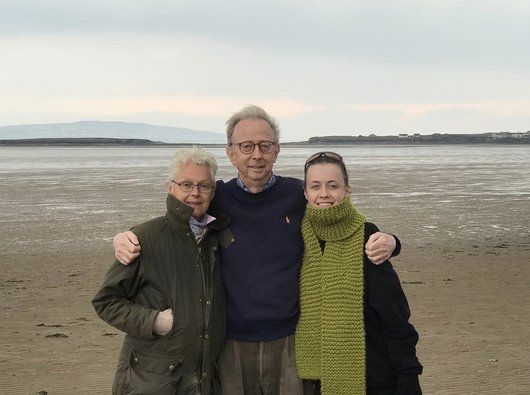
Staying active in hospital
It’s important for people who are having blood cancer treatment as an inpatient to make sure they keep moving. Staying active helps with recovery and mood, so if you are able to visit, offer to take them for a short walk, stretch together, or just help them to change position.
There may be a physiotherapist at the hospital who can advise on exercises to help your love one stay active. Ask your CNS or keyworker about this.
If your loved one has outpatient treatment:
Waiting
If you go with your loved one to an outpatient clinic, be aware that some treatments can take several hours to administer, so you may have a long wait.
If you can’t or don’t want to go into the treatment room with your family member, ask where you can wait. Some hospitals have a waiting room or there may be a Maggie’s Centre nearby where you can find people to chat to or just sit quietly if you prefer. Macmillan information and support centres are also good places to wait and find extra help.
Hospital parking
Finding a parking space can be stressful at the best of times, and when you’re taking someone to hospital for treatment, that’s one thing you don’t want to be worried about.
Try to find out in advance what the parking situation is, so you’re prepared. The hospital website should have information about parking on site and how much it costs.
For some people, parking may be free:
- In England and Northern Ireland, some hospitals offer free parking to people with cancer – contact the hospital to find out if they offer this as they don’t always advertise it.
- In Scotland, parking is free in most hospitals.
- In Wales, parking is free in all hospitals.
Your loved one may be able to get a blue badge (disabled parking badge). Ask your CNS about this or find out more from Macmillan.
Side effects: eating difficulties
Treatment can affect someone’s appetite, or make them feel sick and sometimes be sick. It can also cause a sore mouth and gut (mucositis).
The hospital team have ways to help with these side effects, for instance, anti-sickness medicines and painkillers, so it’s important to report any side effects as soon as they start.
Side effects may make it difficult for your loved one to eat, but it’s important for them to carry on eating if they can. Offer them any food they fancy and avoid things that make them feel worse.
For ideas of foods to try, see our information on sickness and vomiting, and sore mouth or gut (mucositis). You can also go on our online community forum and other online forums to find out what other people have found works for them.
"John really got into smoothies – if he couldn’t manage solid food, he’d at least have some good stuff."
Read Sue’s story: Because family life doesn’t stop for treatment

Side effects: changes in appearance
Some blood cancer treatments can cause bodily changes such as hair loss and weight changes. These are usually temporary but can be upsetting, both for the person experiencing them and for the people close to them.
It may help to be prepared for these changes and talk about them in advance, so ask the hospital team about the possible effects of the treatment your loved one is having. Children in particular tend to accept changes in someone’s appearance more easily if they can talk about it before it happens.

Find out more about side effects
Tips and real stories about side effects like hair loss, peripheral neuropathy, brain fog, sleep problems, infection risk, nausea and sore mouth.
Warning signs to look out for
People with blood cancer have a higher risk of getting seriously ill from infections. So make sure you know what the signs of infection are, and make sure you know who to call if you are concerned when your loved one is at home. You should be given a phone number to call at any time, day or night.
People with blood cancer can get very ill very suddenly. They may also play down their symptoms. If they have a very low level of white blood cells called neutrophils, they are at high risk of an infection turning into a life-threatening condition called neutropenic sepsis.
So it’s important to look out for signs of infection and call the hospital if you are concerned.
This may feel like a big responsibility, but if you’re unsure what to do, make the call – don’t delay. It’s better to be cautious, and the hospital team will give you the advice you need.
If you are at all concerned that something isn’t right, call the number you’ve been given. If you can’t speak to someone on that number, call 999.
We have more information about understanding infection.
Managing family life through treatment
Supporting someone through treatment may involve a lot of thought and planning, especially if you’re looking after children or other adults. Here are some words of advice from people who have been through treatment as a family:
- Don’t be afraid to ask for help. If you don’t feel comfortable about this, remember that most people just want to know what they can do for you, and their offer is genuine. Perhaps a friend or neighbour could make a dinner for the freezer so it’s there when you’re too tired to cook. Or offer a play date for your child if appointments clash with the school run.
- Try to plan ahead. For example, you might need people on stand-by to look after children or walk the dog if you have to take your loved one to hospital at short notice. Or if they’ve been in hospital for a while, think about what will make them feel comfortable when they come home, such as particular things to eat.
- Make sure people understand what’s going on. It’s important for your family and friends to know that your loved one may feel ill or tired and that social plans may have to change at the last minute. Also, that blood cancer and its treatment affect the immune system so if anyone has any signs of illness, they should stay away, even if it’s just a runny nose. Our printed information may help you explain this.
- Be as honest as you can with children. Try to explain what's going to happen before it happens. Children can be very adaptable but many struggle with change, especially when it affects their parents or adults close to them. Be flexible and don't worry if things don't go to plan – it'll be a conversation you come back to many times. Contact our Support Service for help telling children about blood cancer.
- Find out if you can attend appointments virtually. Sometimes it's difficult to attend appointments with the treating team because of other commitments such as looking after children. In these cases, the hospital may be able to include you via video call. Or your loved one could ask permission to record the appointment so you can listen later.
“I’m not always very good at accepting help but I feel better when I think I’ll eventually be able to do someone else a favour.”
Read Janet’s story: Treatment that never stops
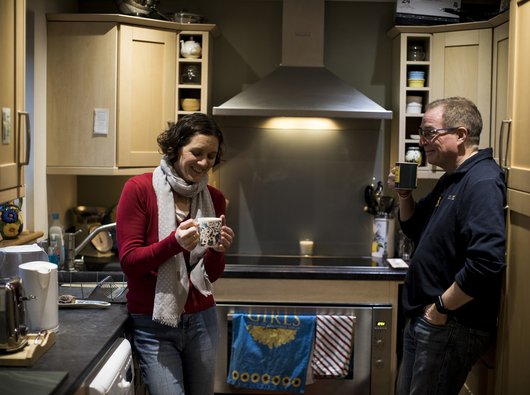
Taking care of yourself
If you’re taking care of someone with blood cancer, whether you’re giving physical or emotional support, you need to look after yourself too.
Many carers say that it is difficult to think about their own needs, especially if they have other responsibilities for children or other family members. But if you can carve out a little time for yourself, this may help you to recharge and be in a better place to help those around you.
We have some ideas for ways to look after yourself, including information on where to get emotional support.
"Your situation is your situation, and you will find your own way through it. Just remember it doesn’t have to be a perfect way, and you don’t have to get it right every time.”
Read Sue’s story, Because family life doesn’t stop for treatment



